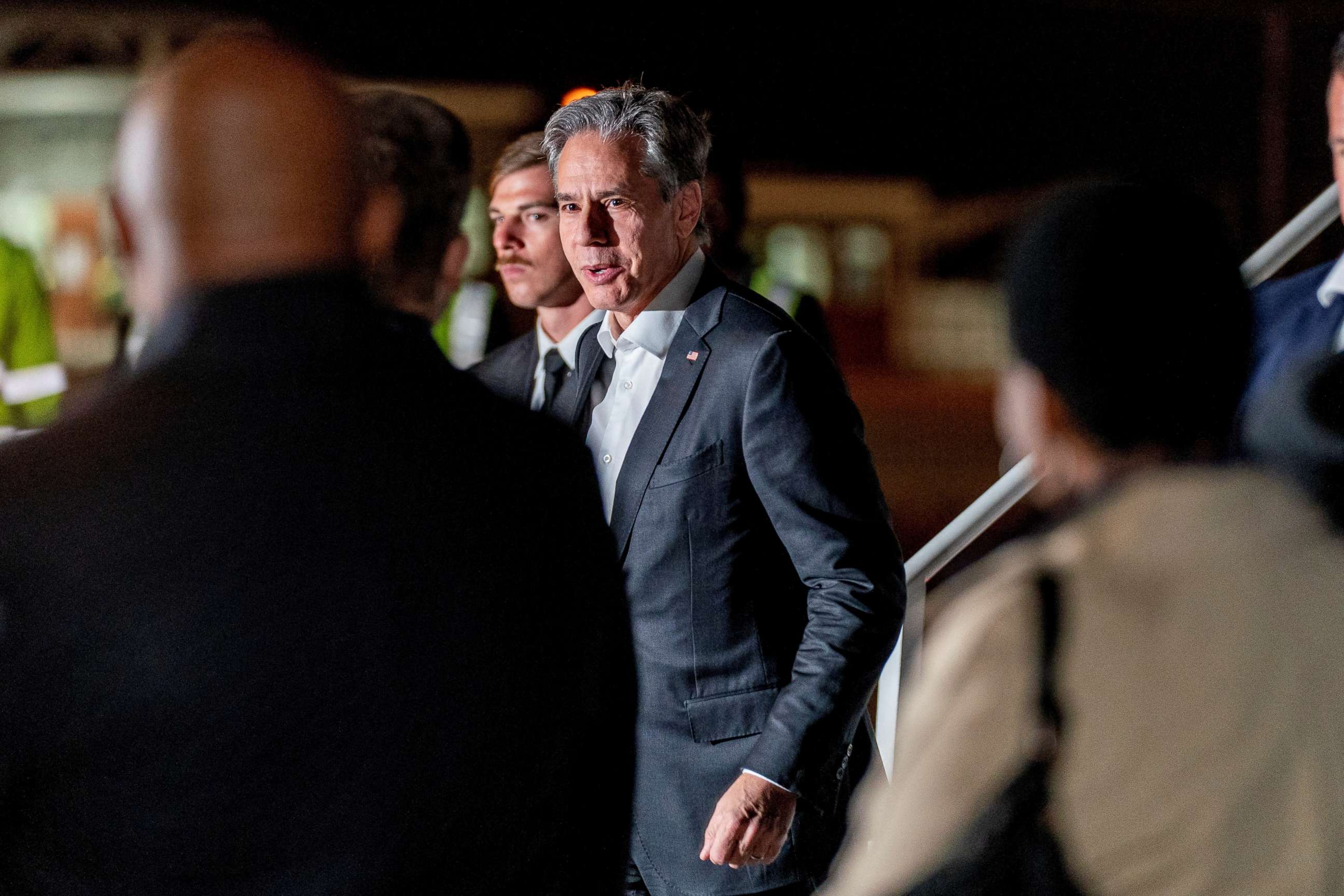Secretary Blinken to arrive in Congo, Rwanda amid international tensions
In Rwanda, Blinken is expected to discuss Paul Rusesabagina's conviction.
NAIROBI, Kenya -- U.S. Secretary of State Antony J. Blinken is scheduled to meet with officials in the Democratic Republic of Congo and Rwanda this week, arriving in the middle of an ongoing conflict between militias and officials in the region.
His trip coincides with a recent surge of deadly violence along the borders between Congo, Rwanda and Uganda. Blinken will be expected by local officials to play the part of a mediator between the three countries.
The Department of State said Blinken will send the message that “African countries are geostrategic players and critical partners on the most pressing issues of our day, from promoting an open and stable international system, to tackling the effects of climate change, food insecurity and global pandemics to shaping our technological and economic futures.”

The long-simmering disputes between the three countries and various militias have complex histories, but some of the most recent violence has stemmed from the fallout of a series of official contracts issued in 2020 for access or rights to lucrative mines in Congo. Since then, militia groups have taken up arms in hopes of expelling rivals and controlling disputed areas.
Congolese President Felix Tshisekedi signed a deal in 2020 with Uganda’s Dott Services Company. The agreement was to construct a road that would give Uganda access to Congo’s tin-rich mining province of Maniema.
But the following year, Felix also signed a mining agreement with Rwandan President Paul Kagame and Dither Ltd., a company alleged to be under the management of Rwanda's army. That deal is alleged by Uganda to have given Rwanda control over the entire mining supply chain.
After the Rwanda agreement, the Ugandan army immediately moved in to protect Dott Services assets and staff from crashes instigated by the March 23 Movement, a rebel militia. Uganda accused the Rwandan government of funding M23, which Rwanda vehemently denies.
In June 2022, the Congolese government suspended all agreements with Rwanda.
M23 has been behind the string of violence against civilians in Bunagana, an open cross-border trade area located between Uganda, Rwanda and Congo that has served as a hub for the militia since March. Members of the group have been accused by officials and international observers of raping women, killing residents, destroying property and stealing civilian livestock.
Thomas Fessy, a senior Congo researcher at Human Rights Watch, said that “since the M23 took control of several towns and villages in North Kivu in June, they’ve committed the same kind of horrific abuses against civilians that we’ve documented in the past. The government’s failure to hold M23 commanders accountable for war crimes committed years ago is enabling them and their new recruits to commit abuses today.”
According to United Nations Office for the Coordination of Humanitarian Affairs, thousands of people have fled to neighboring Uganda.
The M23 movement formed in 2012 when former members of National Congress for the Defense of the People, another militia, turned against the Congolese government by taking control of Goma, a city of over a million people and the capital of the eastern North Kivu province.
The United Nations Stabilization Mission in Congo had been working to quell the conflict until July, when U.N. peacekeepers allegedly shot and killed two civilians and injured others. The killings sparked a civilian protest where 36 people died, including four U.N. peacekeepers, officials said.

The Congolese government expelled U.N. spokesperson Mathias Gillman on Aug. 3, blaming him for the deadly protest. Congolese Foreign Minister Christophe Lutundula also said state officials were reassessing the U.N. mission’s scope after the deadly protests.
U.N. Secretary-General António Guterres said in a statement that he was "outraged" by the incident, adding that he welcomed Congo's decision to detain U.N. "personnel involved in the incident and to immediately open an investigation."

As Blinken lands in Congo on Tuesday, local officials are expecting him to discuss the advancement of peace in the Congo and the broader Great Lakes region and ensuring free, inclusive and fair general elections of 2023.
Blinken is also expected to use his visit to Rwanda on Thursday to discuss Paul Rusesabagina's trial and conviction.
The 67-year-old permanent U.S. resident has been detained in Kigali since August 2020. He was convicted in September of multiple terrorism-related charges and sentenced to 25 years in prison.

Earlier this year, the U.S. Department of State determined that Rusesabagina has been “wrongfully detained.” State Department spokesperson Ned Price has said that U.S. officials were "concerned” about whether Rusesabagina was given a fair trial.
Rwanda released a statement saying, “We look forward to further strengthen the bilateral relationship between Rwanda and United States, and discussing our partnership in areas including peacekeeping, global health (notably the upcoming Global Fund replenishment) global food and energy security, trade and investment, counterterrorism and climate action.”



